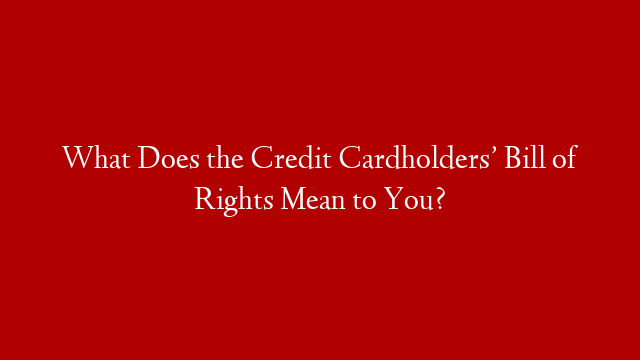I think everyone can agree that the liberal guidelines and liberties exercised by most credit card issuers needs to be reined in. Credit card companies have the ability to change interest rates, fees and credit limits for just about any reason they deem necessary. This leaves consumers, who dare to carry a balance from month to month, completely vulnerable to market swings and the mood swings of the credit card issuers. The credit card companies call this “risk-based management”, and this is exactly what New York Democrat Carolyn Maloney aims to change with her Credit Cardholders’ Bill of Rights.
Risk-based management has been around for a long time and has played a key role in the expansion of the availability of credit. Without risk-based management, fewer people will have access to credit cards and those who hold credit cards will collectively pay a higher interest rate. The risk-based business is supposed to reward cardholders who pay their bills on time and punish those who do not. Without this ability, credit card issuers will be forced to raise their interest rates across the board to compensate for those cardholders who represent a higher risk of defaulting on their debt.
The problem that credit card companies have, or at least are perceived to have, is that they have abused this freedom by using it on cardholders for little or no reason. The specific clause the bill addresses is called the “Universal Default” clause. This section of the credit card agreement allows card issuers to raise rates on current balances and for the future purchases for a variety of reasons. The most common reasons used by credit card issuers to “adjust” the interest rates on cardholders are: credit deterioration, excessive balances, slow payments and even slow payments to other creditors other than them.
The Credit Cardholders’ Bill of Rights is aimed at eliminating risked-based management, among other provisions, and establishing a “fairer” set of rules for credit cardholders. The problem is, in typical Washington fashion, lawmakers have thrown the proverbial baby out with the bathwater. The bill written by Carolyn Maloney, in its current form, will, without a doubt, deliver a one-two punch to banks already reeling from the current mortgage crisis.
One can only assume that the current Bill was designed with the expectations of being watered-down through compromise and negotiations. The problem is, given the current economic conditions and the majority of Democrats in the House and Senate, Congresswoman Maloney might get everything she has asked for, and then some. Like I said, no one disagrees with the need for stricter oversight on the rules that govern credit card companies; but what good are rule changes if nobody can qualify for a credit card and those who can are unwilling to because of the higher rates?
The solution is not to force banks to operate by a specific set of rules drawn up by the same people who drafted regulations for Fannie Mae and Freddie Mac. Instead, the bill should live up to its name and empower cardholders to specific actionable remedies through our court system. This can be achieved by simply eliminating the arbitration clause. Once credit card issuers realize that they may have to explain their actions to a jury of credit card holders, you can bet they will rein in their “unfair “practices in a hurry.



